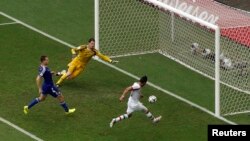With its 1-3 loss to Bosnia on Wednesday, Iran is out of the 2014 World Cup. But its gritty play won rare respect from an international community more accustomed to associating Iran with terrorism and a suspected quest for nuclear weapons.
Iranians all over the world, including staunch opponents of the Islamic regime, exuded pride as foreign commentators praised the team, which started World Cup play with a 0-0 draw with Nigeria, followed by a heart-stopping 0-1 loss to Argentina in a match that also appeared headed for a draw until the final minutes.
A New York Times commentator called Iran’s play against much higher rated Argentina “brilliant.”
A British announcer for ESPN used the adjective “valiant” as did a Tweeter named Squawka Football who detailed Iran’s defensive play: “43 Clearances 17 Blocks 16 Tackles Won 9 Aerial Duels,” ending the tweet with “hats off IRN.”
As it happens, the World Cup – which is held every four years – coincides this year with Iran’s most important diplomatic competition: negotiating a long-term nuclear agreement with world powers that would trade verifiable curbs on its nuclear program for relief of crushing economic sanctions and allow Iranians to begin to return to the normal global citizenship denied them for over three decades.
Just as their soccer team exhibited impressive defensive capabilities, so too have Iran’s nuclear negotiators, led by a U.S.-educated and sophisticated foreign minister, Javad Zarif. Zarif, in a press conference last week in Vienna, took a tough stance, telling reporters, “We will not retreat from our [positions]… With the resistance of the Iranian nation, we are in good condition. We want to reach a conclusion, [and] at the same time protect the rights of the Iranian nation.”
However, success in the negotiations will require compromise on both sides and that includes a reduction of the number of centrifuges Iran is using to enrich uranium.
Currently Iran has about 19,000 centrifuges installed and about 10,000 operating. Non-proliferation experts including Robert Einhorn, a former U.S. negotiator with Iran, have suggested reducing that number to between 2,000 and 6,000 to ensure that Iran cannot quickly amass sufficient material for a nuclear weapon.
One possibility, put forward recently by a former Iranian official and a group of physicists at Princeton University, would gradually phase out Iran’s first generation centrifuges and substitute a smaller number of more sophisticated machines, with strict limits on the amount of low enriched uranium Iran could stockpile.
Iran has reportedly already agreed to concessions on several other key issues, such as modifying a heavy water reactor that will yield plutonium – another potential bomb fuel – and agreeing to stop enriching uranium on a major scale in an underground facility. Other key issues to be decided include the duration of an agreement and how to link Iran’s concessions with phased relief of U.S.-led economic sanctions.
A new publication by the Arms Control Association released today also sketches possible compromises.
Both U.S. and Iranian negotiators have compared a nuclear deal to a Rubik’s Cube: nothing is final until every piece is put into place.
Senior negotiators from Iran, the United States, the other permanent members of the UN Security Council plus Germany (P5+1) are due to reconvene in Vienna on July 2 and plan to stay there and keep trying to piece together the Rubik’s Cube by July 20, when an interim agreement signed last fall expires.
A senior Obama administration official told reporters last week that diplomats and technical experts are already working every day to try to narrow differences and reach a historic conclusion.
“We have this week put together a working document that can provide a way forward in these negotiations,” the official said. “An enormous amount of work has gone into this by everyone – enormous. And we should maintain this level of intense and robust and serious diplomacy and give it every single chance to succeed.”
Chances are that the talks will go to the last minute and into the diplomatic equivalent of overtime. Top figures, including the foreign ministers of the P5+1, are likely to enter the field for the final plays. Diplomatic reporters and other interested spectators from around the world have already booked their hotel rooms in Vienna for much of next month and are preparing themselves for long days and late nights.
Watching both the World Cup and the nuclear talks, I was reminded of a comment made to me some years ago by Kian Tajbakhsh, an Iranian American urban planner and adviser to the World Bank who was twice jailed by the regime for his liberal views.
The Islamic Republic, he said, was like a soccer team where talent is important, but not the most important qualification for membership. The theocratic owners of the team put restrictions on players that allow them to be relatively successful but not as good as they could be with different ownership and criteria for selection.
For most of the last 35 years, Iran has been underperforming as a country.
At times, it has defended itself valiantly – against Iraq during the 1980-88 Iran-Iraq war and more recently, at the World Cup.
But if this ancient nation of 80 million is ever to achieve its true potential, it needs to reintegrate into the global community on more than just a football field. Hopefully, Iranian Supreme Leader Ayatollah Ali Khamenei understands that his people urgently need success in Vienna even more than they did in Brazil.











